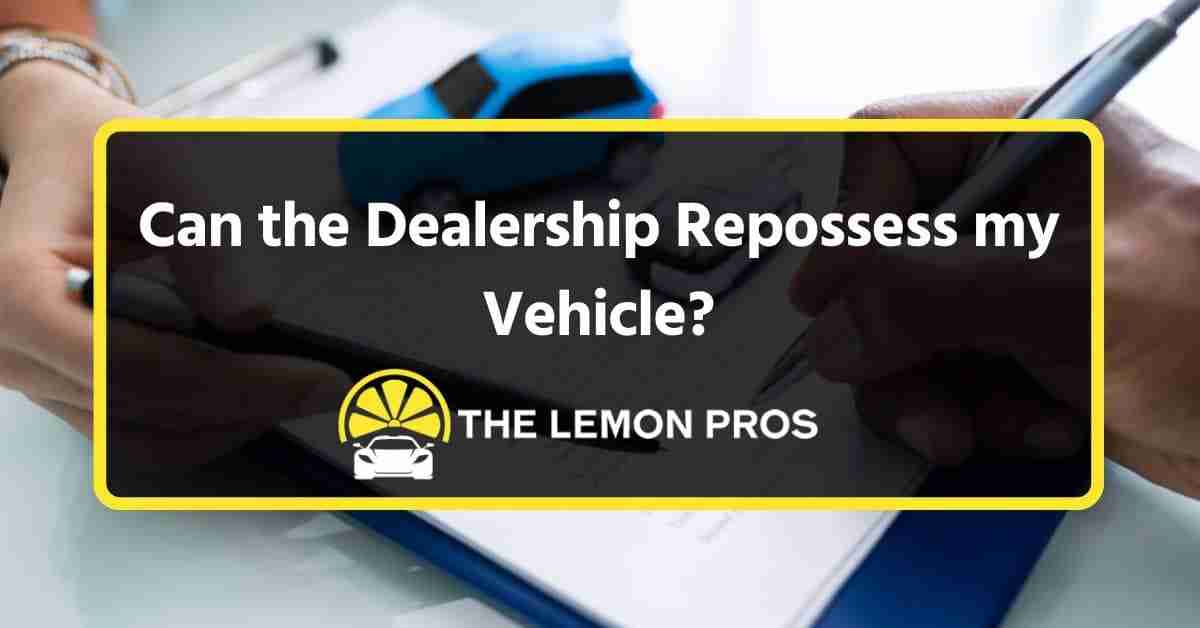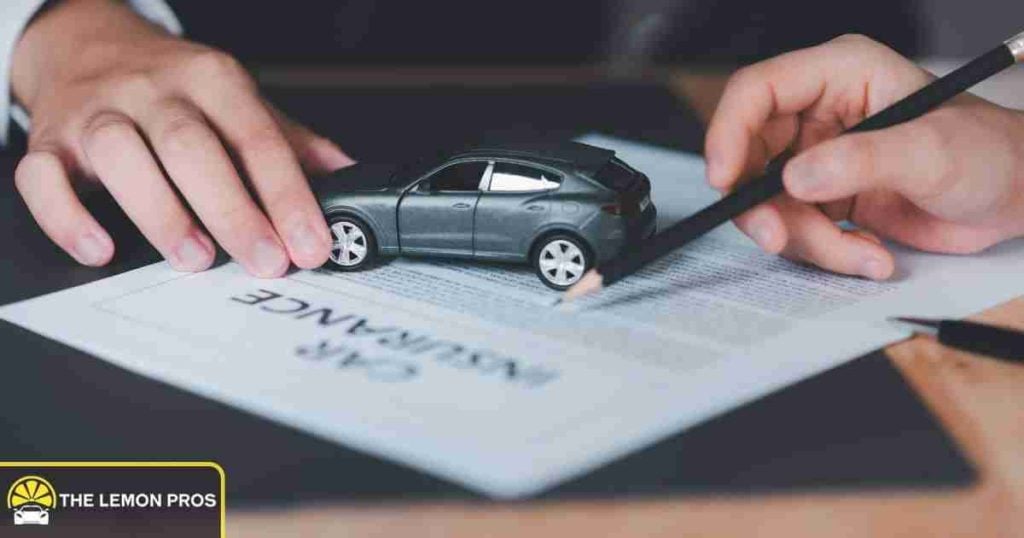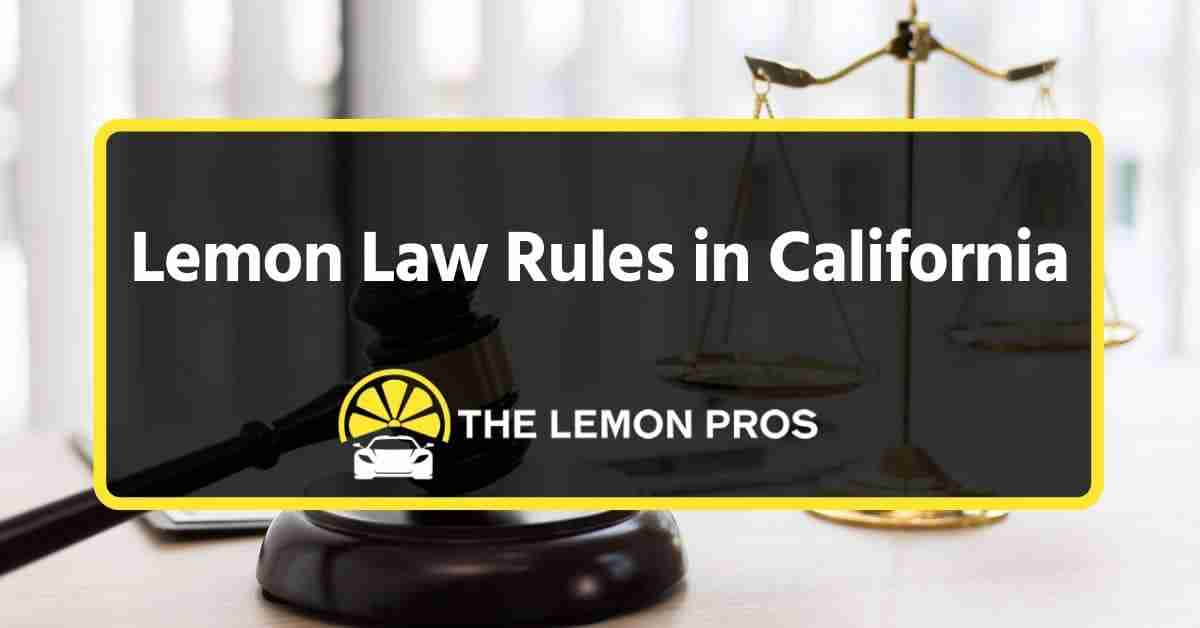
Can the Dealership Repossess My Vehicle?
Disclaimer: The Lemon Pros do not offer assistance with car repossession, this blog is for information purposes only.
There are times when a dealership is allowed to repossess your vehicle and times when the law prohibits them. Dealerships will often attempt every loophole possible to skirt these laws and hope that people are misinformed on what’s legal and what is not.If a dealership fails to follow specific rules and forces you to return your vehicle without your consent, they may have conducted an illegal repossession.
Our California Lemon law lawyers at The Lemon Pros want to make sure you know your rights. We've represented thousands of Californian clients in consumer protection cases, and we want to help you too. Contact us today for a free consultation to get informed about your rights.
In this guide, our team explains the California repossession laws to you, ensuring that your personal property is safeguarded and that you know what you’re entitled to. We cover everything related to a repossessed vehicle, including how consumers are protected by California law and what you can do to avoid repossession.
Table Of Contents
Can a Dealership Repo your Car?

When you purchase a vehicle, the dealership must find a lender to finance the agreement. The dealership generally writes a ten-day window into an agreement, but it can be longer.
If you are current on your payments and the dealership is not able to find a lender after that window, they cannot legally repossess your vehicle because of that reason. The dealership will be required to step into the role of the lender and finance the agreement.
However, dealerships are generally allowed to legally repossess your vehicle if you miss a payment, even if the payment is missed by a day or two. A repossessed vehicle is only a valid solution if you have defaulted on the loan agreement. Nevertheless, if you stop making your payments because the dealership fails to provide you with registration within three months, the dealership cannot repossess your vehicle.
When Can the Dealership Repo Your Car?

A repossession agent will usually get involved if you are late on your payments or if you default. Even if you are a few days late on your car payments, the dealership has the right to repossess your car. Under California law, the dealership can also start the car repossession process if the sales contract is breached.
For these reasons, it’s imperative that you understand your agreement with the finance company. You wouldn’t want to violate any of the terms with the car loan lender, which could lead to possible repossession.
Legal Process for Repossession in California
The repossession agency and guidelines are all governed by federal and state laws, including the Uniform Commercial Code (UCC) and the federal Consumer Financial Protection Bureau (CFPB). For the repo company to take action, the following steps must occur.
Default on Loan Payments
The first step under California repossession laws happens when consumers stop paying the auto loans. Missed payments are considered a breach of contract, giving rights to the financial institution to take your car. It doesn't matter if you are one day or 60 days late; once you've missed the payment, you've opened the door to repossession.
Written Notice
Under California’s repossession laws, the repo agent must provide a notice indicating what can be done to avoid having a repossessed car and when the deadline is. In some cases, there may still be a way to work with the loan company to get back into good standing. By paying the remaining balance, you may be able to get current and hold off the repossession agents.
Repossession of Your Personal Property
If the deadline comes with no resolution, the repossession agencies have the right to take your car. The car can be given back as a voluntary surrender (known as voluntary repossession), or it can be taken. However, repossession agencies may not breach the peace to do so. While the car is usually taken from a publicly accessible place, such as a parking lot, it can be removed from private property. However, no force can be used and the repo agents are not permitted to trespass or violate any laws.
Notice of Sale
Repossessed vehicles are going to be sold, but you are to receive notice of this action before it occurs. If the vehicle is sold at a dealer-only auction, you won't be able to attend and buy back the vehicle. You would need to check with the auction house's rules before attending.
Repossessed Vehicle Sold
To receive the remainder of the portion of the loan balance, California repossession law allows for the vehicle to be sold through a private sale or public auction. After the lender sells, the money goes toward paying down the loan, but it may not fulfill it completely. If the entire loan isn’t paid off, the dealership may file legal action to hold you responsible for the balance and any costs related to the repossession. You may receive a court order and be slapped with a deficiency judgment for breaching the original contract.
The California Department of Consumer Affairs (DCA) has a regulatory role in overseeing consumer-related concerns, including concerns of vehicle repossession. Even though the DCA itself doesn’t handle repossession cases, it will provide information, assistance and resources to consumers who face repossession or have questions regarding their rights.
What to Do if You Are Behind on Car Payments?
The car loan terms set forth what you are expected to pay and how often. As part of the loan agreement, you’ve acknowledged that if you don’t pay, legal action can be taken. Not only may the car be repossessed, but the default could negatively affect your score on your credit report.
If you are behind on your payments, you should attempt to communicate with the lender or dealership before repossession occurs. They will often work with you to find a way to keep your vehicle by reducing your payment, lowering the interest rate, or waiving a payment by adding it to the back end of the contract.
Most lenders do not want to repossess the vehicle or take it to auction. They aren't going to get fair market value at the auction, meaning it will be sold for far less than what it's worth. That leaves them with the hassle of fighting you for the rest of the money, which can be a long and drawn-out process. For this reason, the loan company would rather you catch up on what's owed and start paying timely payments in the future.
What Happens After Vehicle Repossession?

If your vehicle is legally repossessed, the lender will try to sell it at an auction as soon as possible to satisfy the outstanding loan. This may be problematic to you because the vehicle could sell for less than what you still owe on it, with most repossessed vehicles bringing in far less than the typical resale price. If that happens, you will still be liable to pay that difference in addition to having a repossession on your credit history.
However, not all dealerships and lenders follow the laws of repossession in California. Therefore, their actions may spark one of the many reasons to sue a dealership, leaving you with the ability to get compensation.
If you believe that the dealership illegally repossessed your vehicle, we can assist you with getting your money or personal property back. At times, we can force the dealership or lender to pay you extra corrective compensation. Make sure you keep records of any communication or notifications from the dealership or the lender, which can be helpful in proving that the lender didn't provide notice of the upcoming repossession or violated the terms.
First, you must receive prior notice from the lender or repossession companies with clear deadlines. Once the car is repossessed, the agency must store the vehicle properly and provide you with adequate notification about the upcoming sale. You have the opportunity to reclaim the vehicle and your personal property if you can get current on the late payments and other fees that are owed.
If you are unable to meet these obligations, the vehicle is sold and the money earned goes toward the deficiency balance. If the entire amount isn’t covered, you are still liable for the remainder and any other late fees or expenses that have been added.
Additional Car Repossession Agent Resources and Legal Help

If you are facing vehicle repossession, there are ways to get help. For starters, we recommend reading the repossession guidelines set forth by the California Department of Motor Vehicles. We also suggest talking with your car insurance company about pausing or suspending coverage while you don’t have the vehicle in your possession. Find out what this car insurance lapse means for you, especially as you move forward to make a future car deal.
When facing repossession, the repo agent must be registered with the Bureau of Security and Investigative Services. Only a licensed agent is permitted to repossess your car. As they search for the vehicle, they may figure out how to get around a locked garage, private building or gated community where the car is being kept. However, they must retain lawful control of their actions. Yes, they can take the car from a publicly accessible place, but no physical force may be used and laws cannot be broken when they repossess your car.
As the legal owner of the private property, you may have rights concerning how the car is repossessed. For this reason, it’s best to contact a qualified attorney if you're are worried about your rights being violated.
Conclusion
If your car is repossessed and the lender sells your car, you may be responsible for any balance remaining and the fees related to the sale. Before dealing with any repo company, it’s best to have a team of legal professionals on your side, watching out for your rights. You may need help working out terms with the financial institution or gaining access to your personal items as the legal owner.
While The Lemon Pros do not offer assistance with car repossession, we remain dedicated to supporting you through the complexities of California lemon law issues. Our team is committed to providing expert guidance and solutions tailored to your needs, ensuring you receive the assistance necessary to resolve any lemon law concerns. Schedule a free consultation to learn more about your vehicle rights.






